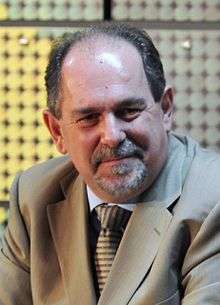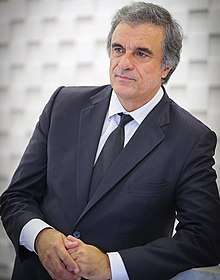2009 Workers' Party (Brazil) leadership election
The 2009 Workers' Party Leadership Election was held on November 22 in order to renew all leaderships of the party (regional, municipal, state and national). On December 6, a second round will be held to determine the new presidents of the party on the states of Minas Gerais, Minas Gerais, Maranhão, Rio Grande do Norte, and Amapá, and several municipalities. On the party's fourth direct election process (Portuguese: processo de eleição direta - PED), 1,3 million members were able to vote. The first round results were officially released on November 26, with former Petrobras president José Eduardo Dutra being elected the national president of the Workers' Party with over 58% of the vote.
| ||||||||||||||||
| ||||||||||||||||
| ||||||||||||||||
National results
President
Former Petrobras president José Eduardo Dutra, from the faction O Partido que Muda o Brasil (English: The Party that Changes Brazil), also known as the "Majority Field", was elected president on the first round with over 58% of the vote. His election is seen as favoring the party's alliance with the Brazilian Democratic Movement Party for the general election of 2010, in which he will be responsible for the party's presidential campaign. He was criticized by the press for having mensalão scandal figures, such as José Dirceu, on his coalition. This will be the first time since the corruption scheme was triggered that such names will return to the National Leadership of the party. The candidate for Mensagem ao Partido (English: Message to the Party), - a dissident faction from the "Majority Field" that arose after the scandal to ask for the expulsion of those involved -, José Eduardo Cardzo, a federal deputy for the State of São Paulo was the runner-up, having received almost 18% of the vote, a decrease from his 19% score in the last election. Nevertheless, he had almost 20,000 more votes, once the party membership grew significantly in the period. Geraldo Magela of Movimento Partido para Todos (English: Movement Party for All) had 12% of the vote, followed by Iriny Lopes of Esquerda Socialista (English: Socialist Left) with 9.9%, Markus Sokol of Terra, Trabalho e Soberania (English: Land, Labor and Sovereignty) with 1%, and Serge Goulart of Virar à Esquerda! Retornar ao Socialismo! (English: Turn to Left! Return to Socialism!) with 0.7%.
| Candidate | Faction | Votes | % |
|---|---|---|---|
| José Eduardo Dutra | O Partido que Muda o Brasil | 271,400 | 58.4 |
| José Eduardo Cardozo | Mensagem ao Partido | 79,867 | 17.9 |
| Geraldo Magela | Movimento Partido para Todos | 58,313 | 12.1 |
| Iriny Lopes | Esquerda Socialista | 50,334 | 9.9 |
| Markus Sokol | Terra, Trabalho e Soberania | 4,951 | 1.0 |
| Serge Goulart | Virar à Esquerda! Retornar ao Socialismo! |
3,292 | 0.7 |
National Leadership
The National Leadership of the Workers' Party is composed of 81 seats to be divided between the factions with the largest number of votes. O Partido que Muda o Brasil also scored the highest number of votes, in spite of having received nearly 20,000 fewer votes than in the presidential race.
| Faction | Votes | % |
|---|---|---|
| O Partido que Muda o Brasil | 250,034 | 55.2% |
| Mensagem ao Partido | 71,663 | 15.8% |
| Esquerda Socialista | 47,984 | 10.6% |
| Movimento Partido Para Todos | 42,657 | 9.5% |
| Partido Para Todos | 24,963 | 5.5% |
| Contraponto | 6,385 | 1.4% |
| Terra, Trabalho e Soberania | 5,908 | 1.3% |
| Virar à Esquerda! Retornar ao Socialismo! |
3,392 | 0.8% |

